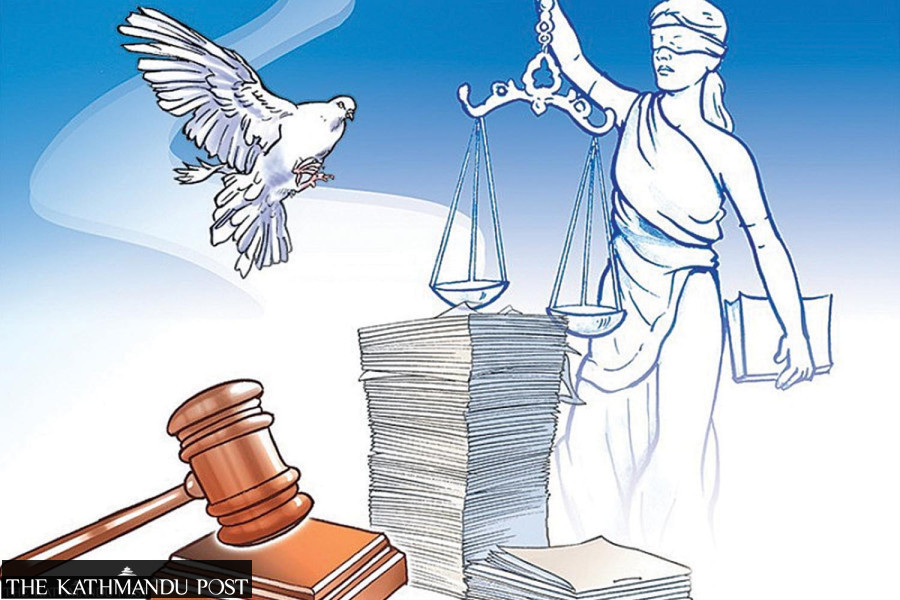National
Transitional justice: Donor help sought to foot Rs40 billion bill
A planned peace fund will be used to pay for reparation and other expenses needed to conclude peace process.
Binod Ghimire
The total cost of concluding Nepal’s transitional justice process could top a whopping Rs40 billion, according to the government’s preliminary estimate.
A back of the envelope calculation by the Ministry of Law, Justice and Parliamentary Affairs suggests that the government needs to put in around Rs10 billion annually over four years to conclude the long-pending process.
The Enforced Disappearances Enquiry, Truth and Reconciliation Commission Act gives four years to the two transitional justice commissions to conclude the remaining tasks of the peace process that started with the signing of the Comprehensive Peace Accord in 2006. However, the tenure of the Truth and Reconciliation Commission and the Commission of Investigation on Enforced Disappeared Persons can be extended if they fail to accomplish their task within the given time.
“The amount can vary depending on the reparation amount the commissions determine and on multiple other expenditures,” an official at the ministry told the Post. The government prepared the rough estimate to present to bilateral and multilateral partners including the United Nations Resident Coordinator’s Office in order to seek their support.
As per the representatives of the government and its development partners, the government requested the latter for their contribution saying domestic sources alone would not cover all expenses. However, not many partner agencies are ready to inject the money into the peace process.
“Except for the Swiss Embassy, no agency promised monetary support. But all the agencies including the UN have assured technical help,” sources present in a meeting of government officials and donor agencies held recently told the Post. Technical support includes human resource and expertise in dealing with the transitional justice process.
The Act envisions setting up a Peace Fund which would be used to provide reparation and other expenses in the process. Through the national budget, the government has allocated Rs1 billion to set up the fund. Though the law ministry has already drafted a regulation to gather resources, the fund is yet to be formed due to the absence of office bearers in the two transitional justice bodies.
The government on October 18 constituted a chief justice-led five-member panel to recommend the office bearer candidates. In its two-month deadline, the committee only announced a shortlist of possible candidates but failed to finalise the list. A new committee to carry forward the task is yet to be constituted.
A representative of a partner agency present in the meeting said their refusal to provide monetary support could change once the commissions start functioning with a broad acceptance of the stakeholders. “I believe the partner agencies want the commissions to function first before making any commitment,” the representative told the Post. “Technical expertise is as important for them to work effectively.”
For instance, Nepal does not have adequate human resources to exhume the bodies believed to have been buried at different locations during the decade-long Maoist insurgency that started in 1996. In 2022, the commission on disappearances wrote to the International Committee of the Red Cross to provide experts for digging up buried bodies. The terms of the commissioners expired before the process could move ahead.
A ministry official said reparation is a strong pillar of transitional justice and demands huge monetary resources. “It will be difficult to manage such a huge amount from the state coffers,” he said.
In the past, successive governments have provided some relief packages to the victims of the insurgency that ended in 2006 but many have yet to receive help. The government provided Rs1 million in relief to the families of those killed or forcibly disappeared during the conflict. However, many such victims were left out.
Records at the Commission of Investigation on Enforced Disappeared Persons show only 1,227 families of victims of enforced disappearances have received compensation. As many as 3,223 complaints of enforced disappearance implicating either security forces or the Maoists have been lodged at the commission. The commission has identified 2,494 of the cases for its investigation.
Victims of sexual violence and rape are the ones who have been most neglected when it comes to getting compensations from the government. As they are unable to lodge complaints owing to social stigma, they have been denied government support.
Though advocates of the rights of conflict victims of rape and sexual violence claim their numbers to be in thousands, only 314 have lodged their complaints with the truth commission. The amended Act has opened a three-month door to such victims to lodge complaints.
Currentently, the truth commission has 63,718 cases, a figure that is sure to grow. As the Act recognises reparation as a victim’s right irrespective of whether the perpetrators are traced, almost all the complainants will be eligible for reparation. This will make the process costly.




 23.27°C Kathmandu
23.27°C Kathmandu















